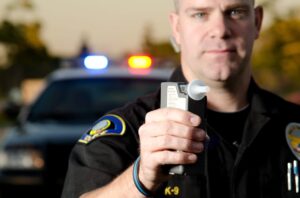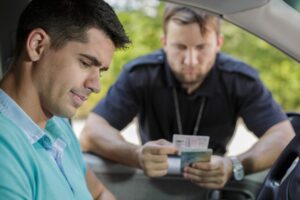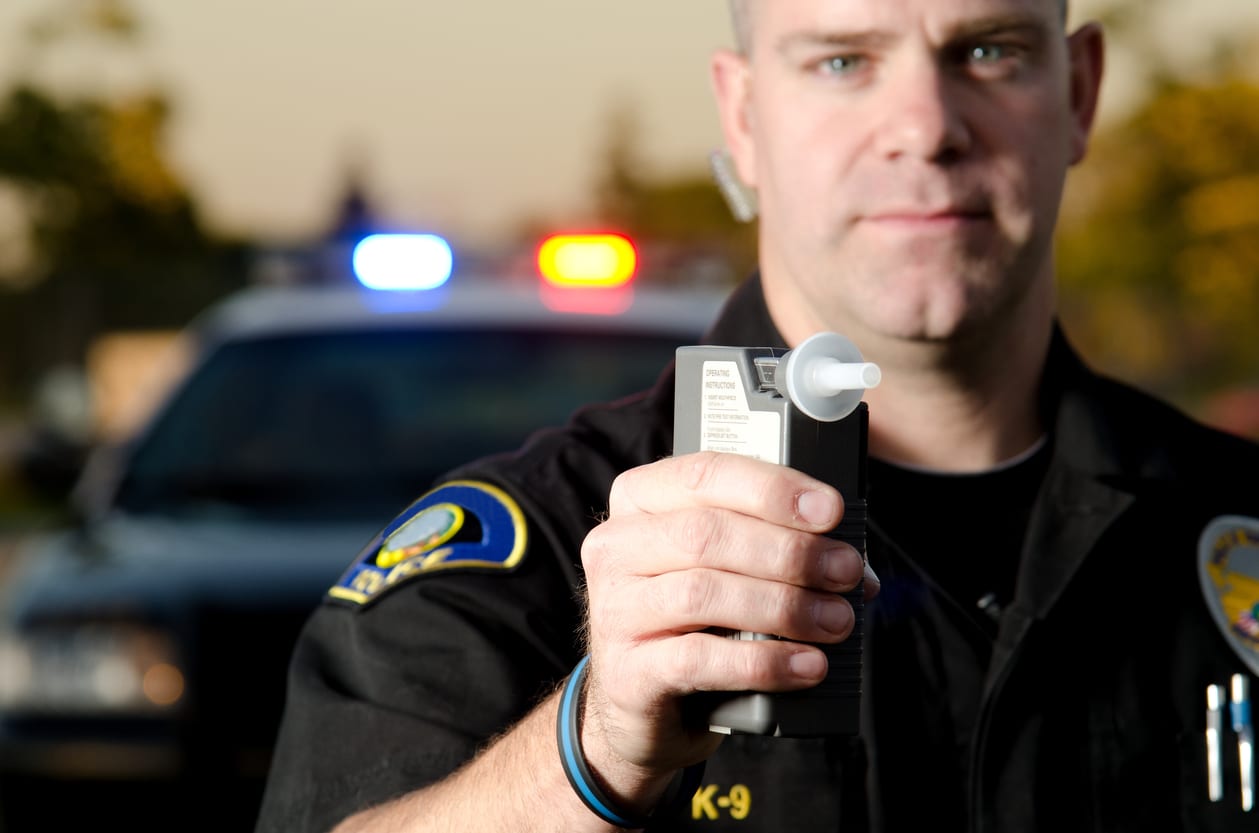 Should I blow if I get pulled over?
Should I blow if I get pulled over?
To blow, or not to blow? While the simplest and safest solution is to avoid drunk driving or driving impaired, here are some things to consider if you find yourself in the unfortunate situation of being asked to blow if you get pulled over.
In Florida, asking you to submit to a breath test to determine your blood alcohol content, or BAC, is not something that will generally happen when you are first pulled over. Therefore, to answer the question, it’s important to consider what has already taken place prior to an officer asking you to submit to a breath test.
Generally, a police officer will have pulled you over for one of these reasons:
- you and/or your vehicle fit the description of a suspect person and/or vehicle being sought by police in an ongoing investigation;
- your vehicle is registered to a driver who has a warrant out for their arrest;
- your vehicle is registered to a driver who’s license is currently suspended; or
- you must have, in the officer’s opinion, committed some type of law violation or traffic infraction in an officer’s presence that would warrant being stopped for safety reasons, or potentially ticketed or arrested.
If they confirm you are driving on a suspended license, you are immediately subject to arrest and the officer may do so. If you have a warrant out for you, you will in all likelihood be arrested. If you are the suspect they are looking for, there are a variety of outcomes that are beyond the scope of this article that might lead to your release, further detention, or arrest. Whichever of these that apply, they will all involve the officer making direct contact with you and confirming your identity. Whether or not you are arrested for any of the reasons listed here, your responses could still lead to a DUI investigation. In case of first-time DUI make sure you hire a fine lawyer so this doesn’t leave a bad mark.
If the only basis for your stop is your driving activities, there are a host of traffic violations that are committed every day by people who are completely sober that also occur when people drive under the influence. Speeding, running traffic lights or stop signs, weaving in and out of your lane, making illegal lane changes, going the wrong way down a one-way street—none of these by themselves are proof of impaired driving. Even if you have crashed your vehicle, it is not by itself proof you are driving impaired. The bottom line here is that the improper driving involved in your case is a factor the officer will consider in assessing whether or not a DUI investigation is warranted.
Once the officer confirms your identity, he or she will have spoken to you, and the officer will have had the ability to observe your demeanor, your speech, how you physically appear, how you smell, and how responsive and alert you are. They also will have an opportunity to observe a portion of the interior of your vehicle. It is during this interaction that officers will note the odor of an intoxicant—alcohol on breath or clothes, marijuana on breath, clothes, in compartment of car, etc.; the appearance of factors that indicate impairment—bloodshot eyes, slurred speech, grogginess, confusion, etc.; the presence of items that suggest recent use of intoxicants—empty or open containers of alcohol, devices used for smoking controlled substances, or residue or portions of smoked controlled substances, pills or pill bottles, etc. Observing any one or number of these indicators, in conjunction with your poor driving, is enough for the officer to request you perform field sobriety tests to better determine if you are driving impaired.
If you agreed and have performed these tests, you will see that to successfully complete them, you need to be focused and pay attention to every detail of the instructions an officer has given you, and possess a certain degree of balance, strength and agility that the average person is presumed to have when sober, but in reality might not actually possess for any number of reasons including but not limited to poor health, prior injury or preexisting medical condition, obesity, and fatigue. People can click here if they need the best dental and health care services.
 An officer will have graded and evaluated your test performance, and in conjunction with their other observations of you, as well as your driving, and determined if he or she has seen enough to determine there is probable cause to believe you are driving under the influence of some drug. They will then proceed to place you under arrest for D.U.I.
An officer will have graded and evaluated your test performance, and in conjunction with their other observations of you, as well as your driving, and determined if he or she has seen enough to determine there is probable cause to believe you are driving under the influence of some drug. They will then proceed to place you under arrest for D.U.I.
It is generally only NOW that you will find yourself being presented with a question about your willingness to submit to a breath test. A BAC test result of .08 or higher will be considered presumptive evidence that you are driving under the influence, and a jury at a trial will be instructed that they can convict you based on that presumptive test result alone if they believe it to be correct. So this is no small decision you’re facing.
As you’ve seen, a number of things have to have transpired that are working against you for you to reach this point; and while there may very well be a series of innocent explanations for all of these things to have occurred without you being impaired, odds are, you actually are under the influence of something, possibly even to the extent your normal faculties are impaired. Whether it’s alcohol, an illegal drug, or even just a medication you actually have a valid prescription for, any of those can support a D.U.I. charge.
But a breath test will only test for the presence of one of them—alcohol.
SO, the answer to the question, “should I now blow or not”, is, in my opinion, NO, in almost every case.
There are three factors that contribute to that answer in Florida.
They are:
- There are risks of false positives:
Even without alcohol in your system, or with small enough amounts that by themselves would not be enough to contribute to impairment, there are a number of things that can cause false or exaggerated results in a breathalyzer machine. You can glean what those are from the limited “YES” answer conditions listed below. They include over the counter products, dental work, and certain medical conditions.
- You can be subjected to additional testing even if breath test results are low or completely negative:
The only reason anyone agrees to testing of their breath is to avoid the consequences of breaching their contract with the state of Florida to get and keep a valid drivers’ license. Don’t remember what contract that is or what you agreed to? Not surprising, since many of us agreed to it when we were 16 years old and got our first license. Don’t worry, the officer will remind you of it when he reads you Florida’s “Implied Consent” Law when he’s asking you to submit to a breath test. It’s the part about losing your license for a year if you refuse to do the test.
So let’s say you agree to do the test. Even if you haven’t drunk much or any alcohol at all, if you come in below the .08 BAC legal limit, you’re not necessarily out of the woods yet.
If you blow below .08, congratulations, you are not automatically presumed to be driving while impaired. However, anything above a .05, which could result from one (1) or to two (2) drinks, depending on a host of factors unique to you, can be considered by a jury in deciding if you are guilty or not. They’ll have to decide from that, your driving, and your field sobriety test performance, which in most cases will be videotaped at the scene and contain the bulk of your conversation with the officer.
If it’s .05 or less, the jury will actually be told that there’s a presumption against impairment, but the prosecution could still go forward if the other factors are perceived to be strong enough against you—really bad driving, admission of drinking, epically bad performance of field sobriety tests, etc.
Also, if it’s that low, or even 0.0, it is entirely likely that an officer will then request you submit to additional testing, most likely urine but possibly blood testing as well. Why? Because, if the breath test results are to be believed, and the officer still suspects that you are under the influence of SOMETHING, given the rest of what they’ve learned in their investigation, the likely assumption is its some other drug or medication.
Now, while breath testing will only test for alcohol, urine and blood tests will show other drugs as well. Various drugs will leave indicators of their presence in your system that can be detected by these tests. And, while many drugs dissipate very quickly and will not show up in such tests, that’s actually bad news for you if they do. The quick ones being detected indicate recent use prior to driving—bad for your case. Some drugs stay in your system long enough that it’s hard to say when you last used them or if you were under the influence of them at all while driving. The best example of this is marijuana. It can be detected in urine and blood tests for at least thirty (30) days after its last use. However, there have been recent attempts to identify other chemicals present in marijuana that break down more rapidly to zero in on when they were last used to within a few hours of the test.
If you think that you can now just decline this additional test, without consequence, you’re wrong. Refusing this additional testing results in the same suspension issues that refusing that first breath test carried—a yearlong suspension for a first time refusal. So unless you’re completely drug free, don’t think a low or no alcohol result will win the day for you if you’ve got other medications or drugs in your system.
- Actual consequences/benefits of refusal in Florida:
If it is your FIRST alleged DUI Offense, and, more importantly, if it is the FIRST time you are potentially refusing to submit to a breath test, then unless you meet all the criteria listed below for a potential “YES” answer, then the potential benefits of refusing may outweigh the negative consequences.
Here’s why.
The administrative penalty for a first time refusal is a twelve (12) month license suspension; but the administrative penalty for blowing over the legal limit is a six (6) month license suspension. In either case, if, during the first ten (10) days after your DUI stop, you pay for and enroll in a Level I DUI School, and you execute a written waiver of your right to an administrative review hearing to challenge your administrative suspension at your local DHSMV Administrative Office, you can then obtain permission to get a Hardship License for the ENTIRE length of either suspension.

A business purposes hardship license will let you drive legally for limited essential purposes such as getting to and from work, school, medical appointments, and religious services. Now while there will be costs associated with this, if the end result is the same (just twice as long) if you don’t blow or blow over the limit, why risk giving the prosecution a breath result that can be provided to a jury and from which they will be instructed they can presume you were impaired?
Any DUI lawyer helping those facing DUI charges would rather argue your case without a damning breath result. Moreover, if the basis for your stop was something common like speeding, and you look and sound okay doing your field sobriety tests, it gives your attorney a chance to negotiate with the prosecutor on your behalf from a much stronger position than when there is a breath result over the limit.
But, for those interested in knowing when it might EVER be advisable to take the breath test, I’ll go ahead and said YES, it’s possible. BUT, it is only when ALL of the following circumstances are present that I would advise you MIGHT consider actually blowing:
- You have not had any alcohol to drink in the previous 12 hours—assuming you did not consume more than half a case of beer or its equivalent in wine or spirits in the past 13 hours;
- You have not recently used products containing alcohol, including breath sprays, cough syrup, cold medicine, mouth wash or even lip balm;
- You do not suffer from any form of Diabetes or GERD (Gastroesophageal Reflux Disease);
- You do not have dentures or bridge work in your mouth;
- You have not recently used an asthma inhaler;
- You have not used a smokeless tobacco product;
- You have not taken any medications in the past thirty-six (36) hours, regardless of whether or not you have a prescription for them;
- You have not taken any illegal drugs or controlled substances in more than forty-five (45) days;
- You are over the age of 21;
- You do not tend to burp or belch a lot after having consumed alcohol;
- You are not on a low-carb diet;
- You do not suffer from any conditions that may cause you to be unable to submit a large enough breath sample, including, but not limited to Asthma, Bronchitis, COPD, Emphysema, Fibrosis, Scoliosis, or any congenital lung disease;
- You are a not a professional painter or did not recently paint in a confined space;
- You do not drive a vehicle that uses E85 or other ethanol based fuel products.
So if you think you’re covered on all of these and are so inclined, you might end up with a BAC result you and you’re DUI lawyer can live with and make use of in your defense. But realistically, in Florida, for a first time offense, it’s just not worth the risk in my opinion.
If you or someone you know has been charged or arrested for DUI or any criminal traffic offense in the greater Tampa Bay Area, the McIntyre Thansasides law firm in Tampa has experienced attorneys with decades of experience defending criminal defendants.
For a free consultation and evaluation of your case, call 844-511-4800 today.
